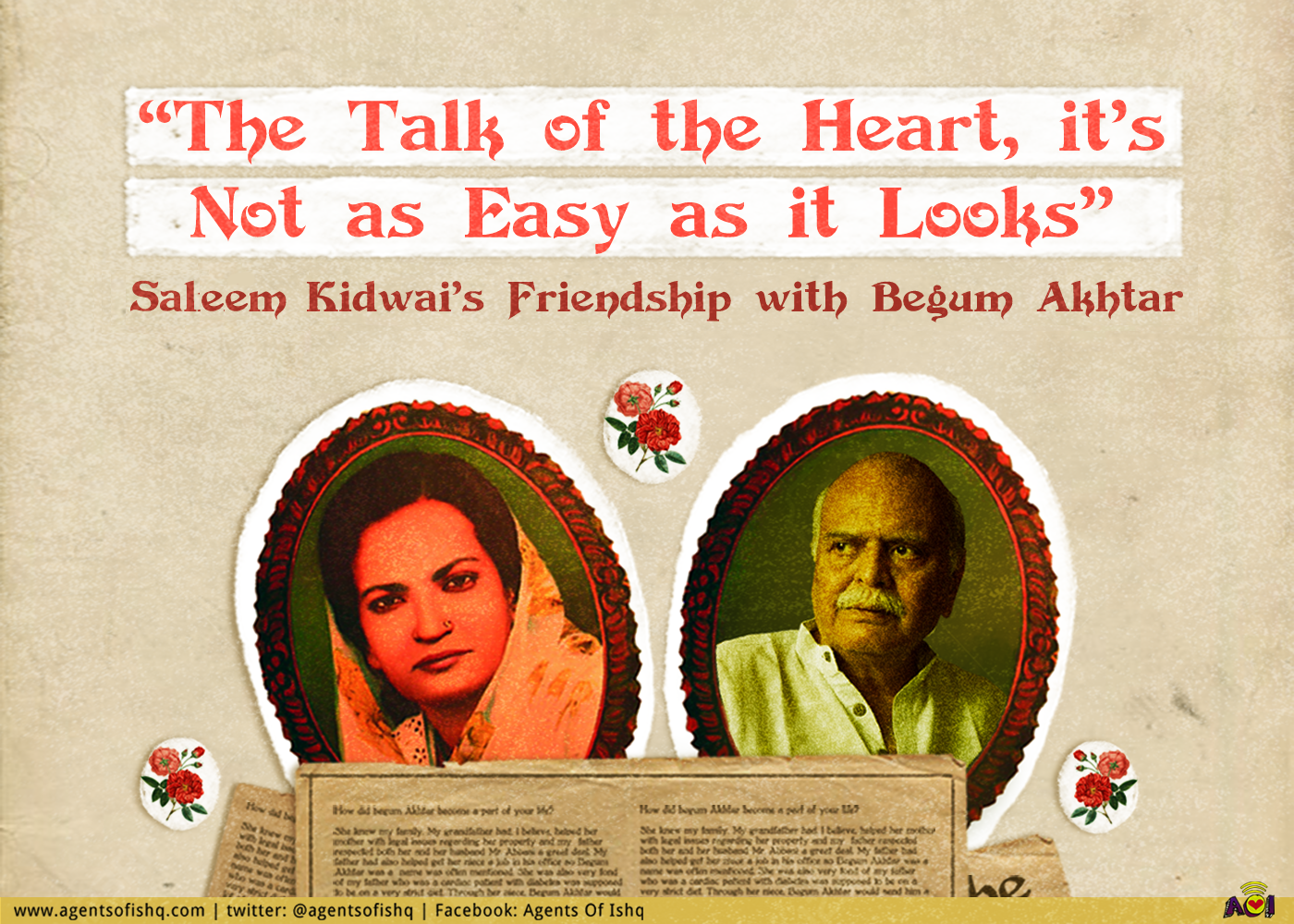 The following interview has been edited and condensed for clarity. The interview was between the late Saleem Kidwai and Aditya Vikram ShrivastavaQ: How did begum Akhtar become a part of your life?A: She knew my family. My grandfather had, I believe, helped her mother with legal issues regarding her property and my father respected both her and her husband Mr. Abbasi a great deal. My father had also helped get her niece a job in his office so Begum Akhtar was a name was often mentioned. She was also very fond of my father who was a cardiac patient with diabetes was supposed to be on a very strict diet. Through her niece, Begum Akhtar would send him a lot of forbidden goodies. The word would get to my mother who would remark, ‘so chachi is spoiling him again,” And then there was the voice on the radio which we as children heard often but payed little attention to. The only ghaza that I remember was Aye mohobbat, because it was broadcast a lot on the radio.At that point in time, I was not listening to anything except Hindi film music. Then, in 1967, I moved to Delhi to study. Someone said that she was performing at the Sapru House and insisted that I should come along. There, I first heard her sing live. And what an experience that was. Seeing her on stage and hearing that voice was transformative. She exuded this charm and this magnetism from the stage, that even as a seventeen year old I was struck by it - this image of her sitting on that stage in the spotlight with the harmonium and smiling, smiling naturally, her diamond nose stud flashing as she moved her head.What stuck with me, was the way she caressed her notes, the way she captivated the audience by making it seem she was singing for each one of them specifically. Sometimes she would address them, sit here, sit there, come come, where have you been?
The following interview has been edited and condensed for clarity. The interview was between the late Saleem Kidwai and Aditya Vikram ShrivastavaQ: How did begum Akhtar become a part of your life?A: She knew my family. My grandfather had, I believe, helped her mother with legal issues regarding her property and my father respected both her and her husband Mr. Abbasi a great deal. My father had also helped get her niece a job in his office so Begum Akhtar was a name was often mentioned. She was also very fond of my father who was a cardiac patient with diabetes was supposed to be on a very strict diet. Through her niece, Begum Akhtar would send him a lot of forbidden goodies. The word would get to my mother who would remark, ‘so chachi is spoiling him again,” And then there was the voice on the radio which we as children heard often but payed little attention to. The only ghaza that I remember was Aye mohobbat, because it was broadcast a lot on the radio.At that point in time, I was not listening to anything except Hindi film music. Then, in 1967, I moved to Delhi to study. Someone said that she was performing at the Sapru House and insisted that I should come along. There, I first heard her sing live. And what an experience that was. Seeing her on stage and hearing that voice was transformative. She exuded this charm and this magnetism from the stage, that even as a seventeen year old I was struck by it - this image of her sitting on that stage in the spotlight with the harmonium and smiling, smiling naturally, her diamond nose stud flashing as she moved her head.What stuck with me, was the way she caressed her notes, the way she captivated the audience by making it seem she was singing for each one of them specifically. Sometimes she would address them, sit here, sit there, come come, where have you been?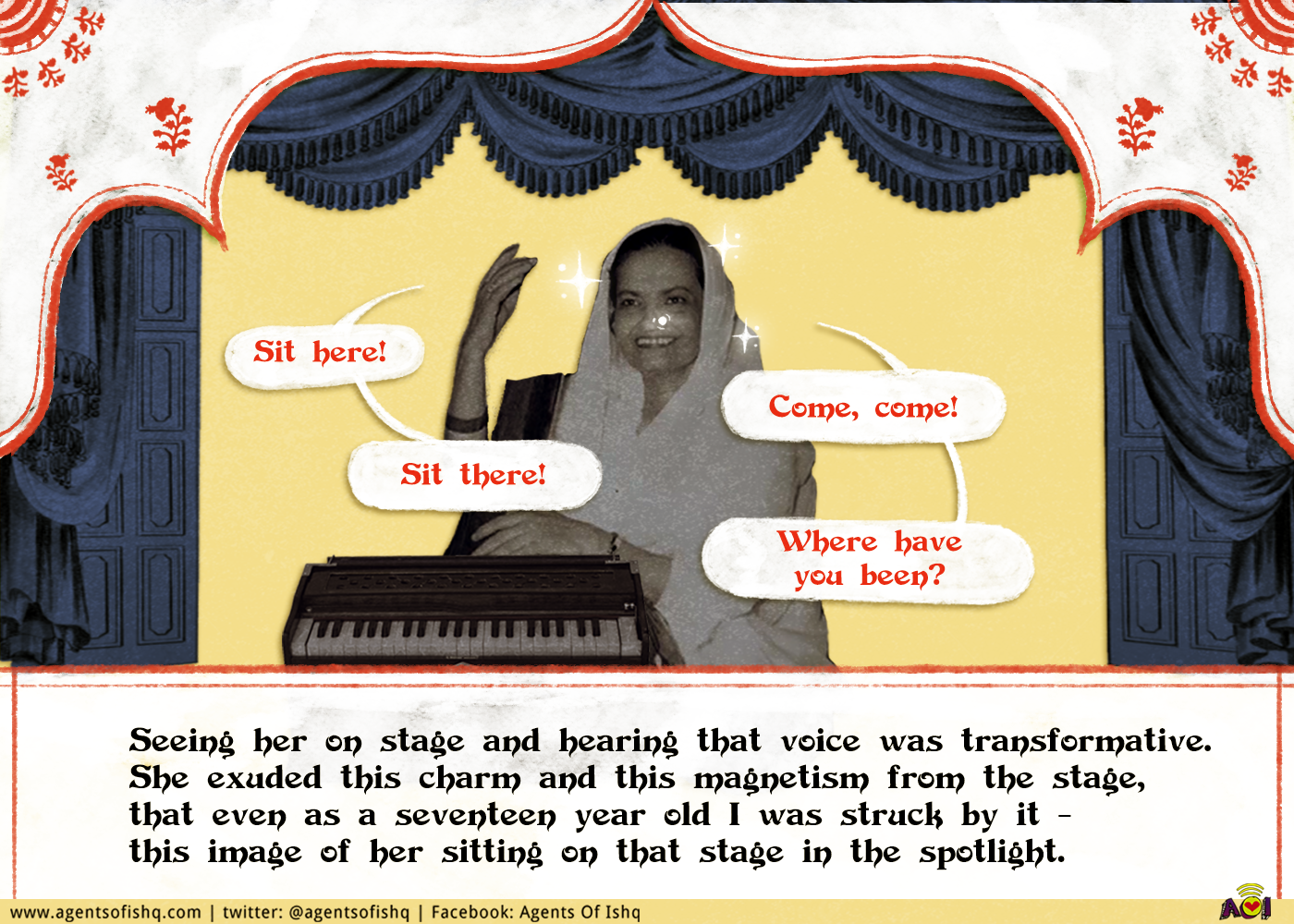 Q: Would you say that you became ‘friends’ with her then, or was it something different?A: I heard her, then I heard her again. When I came to Lucknow next, I mentioned this to my father and how much I had enjoyed her concerts. He insisted on taking me to meet her. I just kept quiet as they talked about their own stuff and I noticed how much she smoked – unfiltered cigarettes. Abbu told her that I go to listen to her. She asked me, “Why didn’t you come meet me afterwards?” I was stayed silent – I couldn’t say that there were so many people who rushed backstage after each concert. Then she told me when she would be performing in Delhi again , and where she would be staying and asked me to come and see her. When I went to meet her, she immediately recognized me: “come, sit, sit, don’t leave just now. What will you drink? Tea or something cold.” She picked up the phone and ordered a coke from room service. She was genuinely warm and asked if I would be attending her concert the next day. When I said yes, she said, “come here first at so and so time. You come with me.” And she was such a enchanting person, my heart didn’t want me to leave. Even if I was not talking to her. A lot of people would come to meet her, important music Ustads, well known poets and even film stars. so I became that quiet boy in the corner, listening to the conversation. As she grew fonder of me and I began to relax, I often asked her about her important visitors and she had interesting stories to tell, even innocent gossip about them. I remember after Nargis had left, she told me a lot about her famous mother Jaddan Bai, who was also a singer.
Q: Would you say that you became ‘friends’ with her then, or was it something different?A: I heard her, then I heard her again. When I came to Lucknow next, I mentioned this to my father and how much I had enjoyed her concerts. He insisted on taking me to meet her. I just kept quiet as they talked about their own stuff and I noticed how much she smoked – unfiltered cigarettes. Abbu told her that I go to listen to her. She asked me, “Why didn’t you come meet me afterwards?” I was stayed silent – I couldn’t say that there were so many people who rushed backstage after each concert. Then she told me when she would be performing in Delhi again , and where she would be staying and asked me to come and see her. When I went to meet her, she immediately recognized me: “come, sit, sit, don’t leave just now. What will you drink? Tea or something cold.” She picked up the phone and ordered a coke from room service. She was genuinely warm and asked if I would be attending her concert the next day. When I said yes, she said, “come here first at so and so time. You come with me.” And she was such a enchanting person, my heart didn’t want me to leave. Even if I was not talking to her. A lot of people would come to meet her, important music Ustads, well known poets and even film stars. so I became that quiet boy in the corner, listening to the conversation. As she grew fonder of me and I began to relax, I often asked her about her important visitors and she had interesting stories to tell, even innocent gossip about them. I remember after Nargis had left, she told me a lot about her famous mother Jaddan Bai, who was also a singer.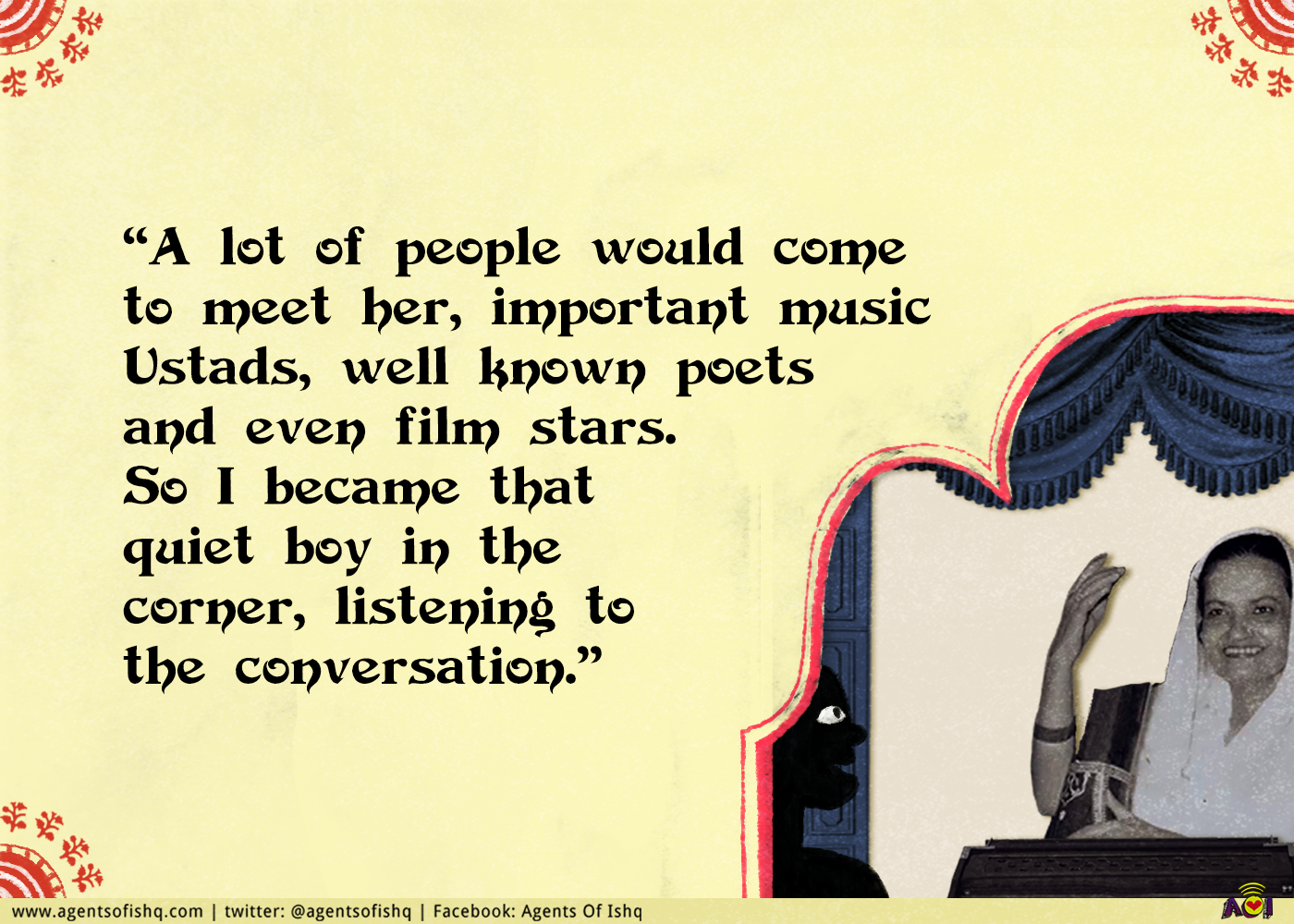 Q: How would you describe the friendship?A: Friendship kya this was pure hero worship. It was like being in sunlight. And she liked that admiration. She liked that admiration of two young men, Shahid (Agha Ali, the poet) and I. She got very informal with us. Dekho, there was obviously an age difference. I think it was very important to her that two very young men were in such great awe of her. Because she had a very large audience base among a slightly older population. But to find two young people who should have been interested in other sorts of music, other sorts of leisure, who were constantly following her as admirers, that was I think very flattering for her. Those two young men who were different from every other person who was hanging around her.Shahid and I, both of us went around with her everywhere. She would say, “Oh, I have been invited to sing for so and so but you come along with me and we would happily go along to some very exclusive concerts. Then she would also take us along when she was invited to private dinners. Once I resisted and said we would get the reputation of being her chamchas who never let her alone. She didn’t understand the term and when I explained she broke out in a laugh. After that, often she began using the term to tease us. I also made a calendar for her visits, like she’s coming next month on the seventh, then she’s coming on the 20th, so we lived from visit to visit. Because once she was there, we did nothing else but hang around and enjoy what she did.I enjoyed the naughtiness of her. It was sort of unconventional, this thing about her.. She knew I smoked and would go out of the room to do so and had begun insisting that we could smoke in her presence. And I remember this one Eid day when I went to see her in Lucknow, with my father sitting right in front of me. She came and stood in front of me, blocking the view of my father. She put her hand behind and offered her lit cigarette to me. Gesturing with her hand - piyo piyo piyo (smoke smoke smoke). I had to literally take her Capstan and take a puff, which I would never do with my father in the same room. But she provoked me, so I had to smoke it in front of my father. And she enjoyed the prank thoroughly, being complicit in this little mischief.Once she came to visit us at the medical college, my father was in the ICU, he had a heart attack. She saw me sitting next to my father on a stool for someone had to sit there by his side. When she went back, the first thing she did was send one of those folding chairs - Don’t sit on the stool, sit on this. So she also treated me with very special affection, very special affection!
Q: How would you describe the friendship?A: Friendship kya this was pure hero worship. It was like being in sunlight. And she liked that admiration. She liked that admiration of two young men, Shahid (Agha Ali, the poet) and I. She got very informal with us. Dekho, there was obviously an age difference. I think it was very important to her that two very young men were in such great awe of her. Because she had a very large audience base among a slightly older population. But to find two young people who should have been interested in other sorts of music, other sorts of leisure, who were constantly following her as admirers, that was I think very flattering for her. Those two young men who were different from every other person who was hanging around her.Shahid and I, both of us went around with her everywhere. She would say, “Oh, I have been invited to sing for so and so but you come along with me and we would happily go along to some very exclusive concerts. Then she would also take us along when she was invited to private dinners. Once I resisted and said we would get the reputation of being her chamchas who never let her alone. She didn’t understand the term and when I explained she broke out in a laugh. After that, often she began using the term to tease us. I also made a calendar for her visits, like she’s coming next month on the seventh, then she’s coming on the 20th, so we lived from visit to visit. Because once she was there, we did nothing else but hang around and enjoy what she did.I enjoyed the naughtiness of her. It was sort of unconventional, this thing about her.. She knew I smoked and would go out of the room to do so and had begun insisting that we could smoke in her presence. And I remember this one Eid day when I went to see her in Lucknow, with my father sitting right in front of me. She came and stood in front of me, blocking the view of my father. She put her hand behind and offered her lit cigarette to me. Gesturing with her hand - piyo piyo piyo (smoke smoke smoke). I had to literally take her Capstan and take a puff, which I would never do with my father in the same room. But she provoked me, so I had to smoke it in front of my father. And she enjoyed the prank thoroughly, being complicit in this little mischief.Once she came to visit us at the medical college, my father was in the ICU, he had a heart attack. She saw me sitting next to my father on a stool for someone had to sit there by his side. When she went back, the first thing she did was send one of those folding chairs - Don’t sit on the stool, sit on this. So she also treated me with very special affection, very special affection!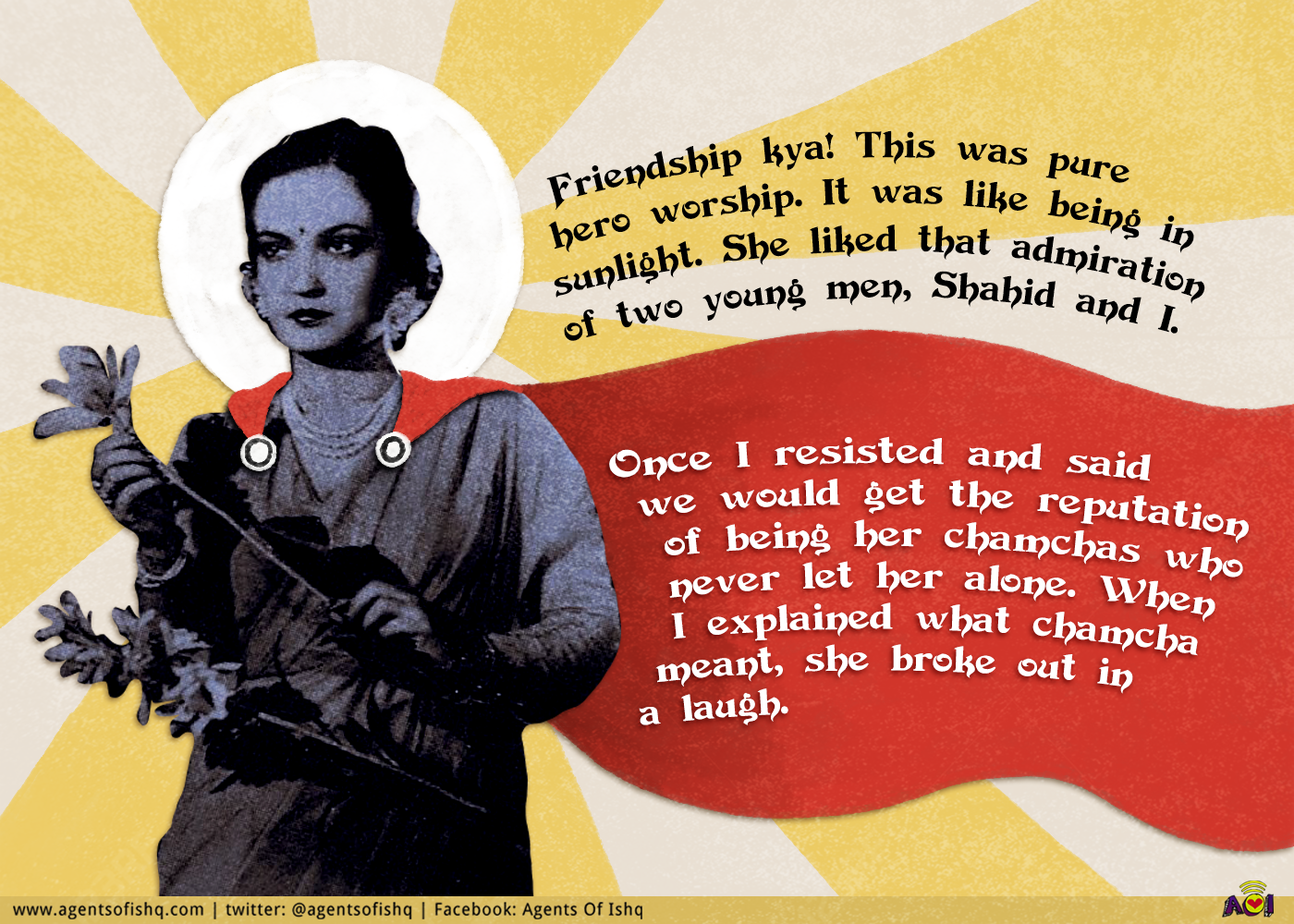 Q: And maybe she was free with you because both of you were gay men?A: That she didn’t know. She might have guessed, maybe, but it did matter to her that these were two young men that were so besotted with her. Q: She must have had a large fanship with gay men, noh? Maybe she still has, I don’t know if it is right to say so, haha-A: Oh yes, every gay man I knew then, was in love with her music. I mean for gay men her lyrics which were mostly about heart break and longing, made a lot of sense. I don't know how it happens with this generation but in our generation this was there. You fell in love with someone, and it might be a straight man who is not recognizing it or reciprocating it. Gay men knew all about the agony of being in love. It was reason why Meena Kumari was so popular with gay men too. Ki she is suffering away, her heart is broken and she’s dying on a bed of tears. Drinking away her grief, both she and Akhtari. Q: Whenever you mention a memory with Begum Akhtar, Shahid is almost always in the picture! So what about Shahid’s connection with you and her?A: Shahid and I became friends around the same time when I had gotten to know her, In the initial stages you know, very importantly, he cultivated me as a friend because I was his access to Begum Akhtar. But then once that was done, we became very good friends. Our love for her brought us close. After that even her memory kept us close. You have read that poem Shahid wrote for her? To Begum Akhtar? We buried her and he started writing it that very night. He talks about how, once she died, we were mourning but we didn’t know how to deal with it. Luckily there were two of us so we did it together, and I think that brought us a lot closer. How do you mourn someone you love? You start collecting everything about her. So then, every little piece or thing that we found about her, we got it. When Shahid had gone (to the US), whatever new thing would be published, anything that was published about her, I would buy two copies and send one to Shahid. If he found anything, he would make a copy and I would make a copy. We collected everything we could find about her. I mean these photos, these cuttings, they didn’t come to my house just like that. I would go to the road everyday, sit there with magazines that were being sold. Is there anything published in this? And then buying 4-5 copies of it, that was like a daily exercise. A mourning ritual, thinking that you can’t mourn her if you don’t find little stuff written about her.
Q: And maybe she was free with you because both of you were gay men?A: That she didn’t know. She might have guessed, maybe, but it did matter to her that these were two young men that were so besotted with her. Q: She must have had a large fanship with gay men, noh? Maybe she still has, I don’t know if it is right to say so, haha-A: Oh yes, every gay man I knew then, was in love with her music. I mean for gay men her lyrics which were mostly about heart break and longing, made a lot of sense. I don't know how it happens with this generation but in our generation this was there. You fell in love with someone, and it might be a straight man who is not recognizing it or reciprocating it. Gay men knew all about the agony of being in love. It was reason why Meena Kumari was so popular with gay men too. Ki she is suffering away, her heart is broken and she’s dying on a bed of tears. Drinking away her grief, both she and Akhtari. Q: Whenever you mention a memory with Begum Akhtar, Shahid is almost always in the picture! So what about Shahid’s connection with you and her?A: Shahid and I became friends around the same time when I had gotten to know her, In the initial stages you know, very importantly, he cultivated me as a friend because I was his access to Begum Akhtar. But then once that was done, we became very good friends. Our love for her brought us close. After that even her memory kept us close. You have read that poem Shahid wrote for her? To Begum Akhtar? We buried her and he started writing it that very night. He talks about how, once she died, we were mourning but we didn’t know how to deal with it. Luckily there were two of us so we did it together, and I think that brought us a lot closer. How do you mourn someone you love? You start collecting everything about her. So then, every little piece or thing that we found about her, we got it. When Shahid had gone (to the US), whatever new thing would be published, anything that was published about her, I would buy two copies and send one to Shahid. If he found anything, he would make a copy and I would make a copy. We collected everything we could find about her. I mean these photos, these cuttings, they didn’t come to my house just like that. I would go to the road everyday, sit there with magazines that were being sold. Is there anything published in this? And then buying 4-5 copies of it, that was like a daily exercise. A mourning ritual, thinking that you can’t mourn her if you don’t find little stuff written about her. 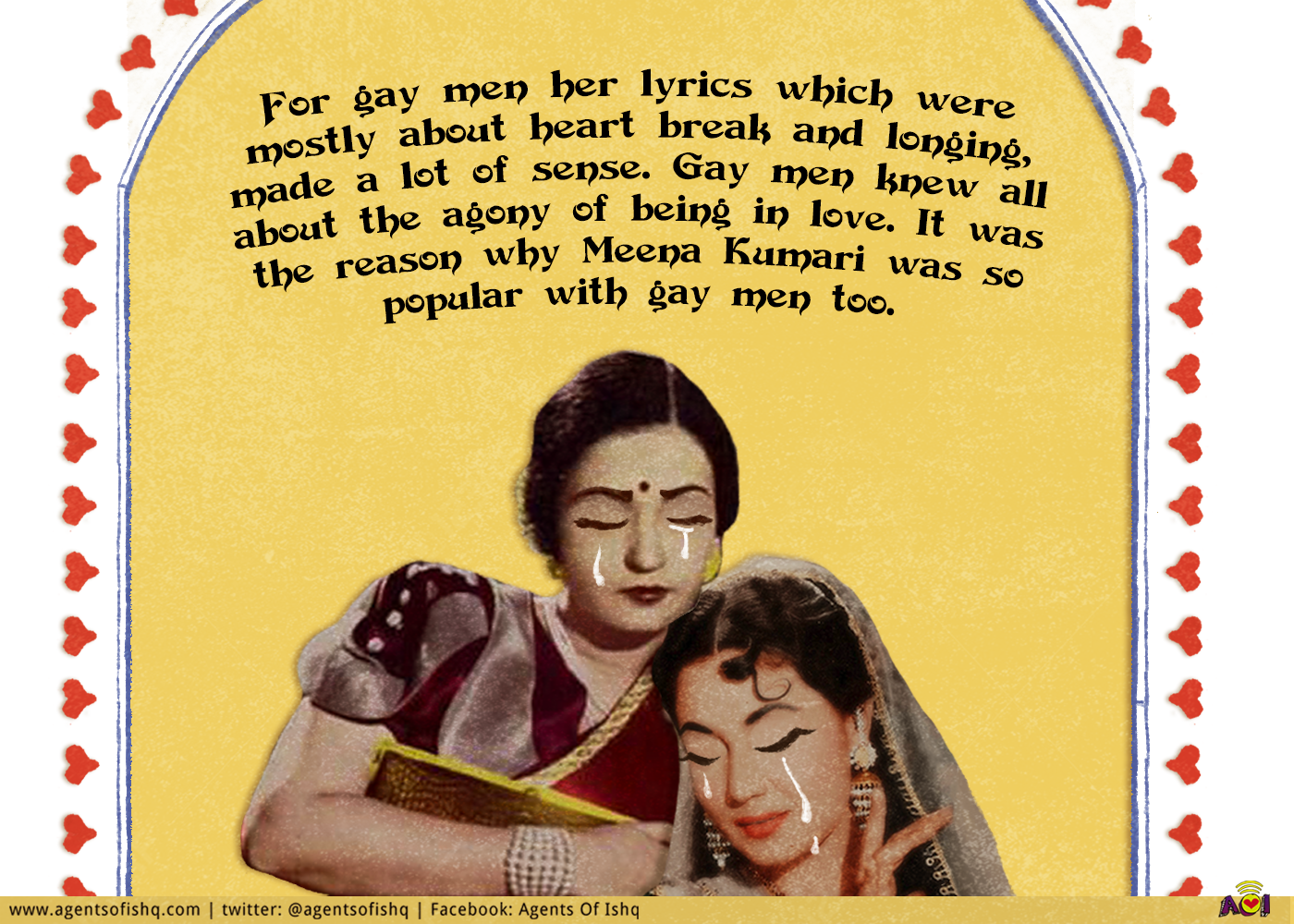 Q: You were a young student, how did the relationship impact your career?A: Yeah I was young. And I was a different person you know. I was college going, timid, shy, and couldn't speak in front of people. Her art changed me, but of course it impacted me in other ways too. Those three years, the last three years of her life when we had set up an organization called Bazm-e-rooh-e-ghazal, that arranged programmes for her. All the money we collected from the advertisements in the brochure we would give her which was far higher than what she charged for a normal concert. I was also teaching. I could have spent that time on my PhD, instead of running around Connaught Place and trying to get advertisements. I mean she became a priority and not my career. Q: Will you write about her?A: Well.. some things have become cliches. Everyone is repeating the same things, and sometimes things which are not even true. For instance, the fact that after marriage her miyan prohibited her singing? Complete idiocy. He was so much in love with her, he would never say no to her. But the thing was that when you leave a kotha and go to a respectable family, obviously you have decided you will not sing as publicly as you did before. That was a political statement of the time that she was making. Not that she stopped singing because whenever miyan would call someone for dinner, she would sing for them and she sang for friends. The music industry lives on myths and legends and reinventions.I have all the material, so many interviews with people from her times, that were a part of this whole grieving process. I used to talk to people she knew. So I was discovering things about her. If I want to write about her, I want to do it as a historian. It should be a biography that people would read and say, yeah this is how a biography should be written. I can’t do that because it would mean betraying her. I have come to understand certain things about her which she, in her life, did everything to hide. And in this I’m not talking about sexual escapades or romance or sex - none of that is hidden. There were also personal grievances she had as a woman. Agar koi bhi kisi apne se sachcha pyaar karta hai toh wo unke baare mein wo baatein nahi likhega, jo unki marzi ke khilaaf hon.(If you truly love someone as your own, you will not write things about them they would not have willingly shared). Her music and records are there. They will stay alive.
Q: You were a young student, how did the relationship impact your career?A: Yeah I was young. And I was a different person you know. I was college going, timid, shy, and couldn't speak in front of people. Her art changed me, but of course it impacted me in other ways too. Those three years, the last three years of her life when we had set up an organization called Bazm-e-rooh-e-ghazal, that arranged programmes for her. All the money we collected from the advertisements in the brochure we would give her which was far higher than what she charged for a normal concert. I was also teaching. I could have spent that time on my PhD, instead of running around Connaught Place and trying to get advertisements. I mean she became a priority and not my career. Q: Will you write about her?A: Well.. some things have become cliches. Everyone is repeating the same things, and sometimes things which are not even true. For instance, the fact that after marriage her miyan prohibited her singing? Complete idiocy. He was so much in love with her, he would never say no to her. But the thing was that when you leave a kotha and go to a respectable family, obviously you have decided you will not sing as publicly as you did before. That was a political statement of the time that she was making. Not that she stopped singing because whenever miyan would call someone for dinner, she would sing for them and she sang for friends. The music industry lives on myths and legends and reinventions.I have all the material, so many interviews with people from her times, that were a part of this whole grieving process. I used to talk to people she knew. So I was discovering things about her. If I want to write about her, I want to do it as a historian. It should be a biography that people would read and say, yeah this is how a biography should be written. I can’t do that because it would mean betraying her. I have come to understand certain things about her which she, in her life, did everything to hide. And in this I’m not talking about sexual escapades or romance or sex - none of that is hidden. There were also personal grievances she had as a woman. Agar koi bhi kisi apne se sachcha pyaar karta hai toh wo unke baare mein wo baatein nahi likhega, jo unki marzi ke khilaaf hon.(If you truly love someone as your own, you will not write things about them they would not have willingly shared). Her music and records are there. They will stay alive. 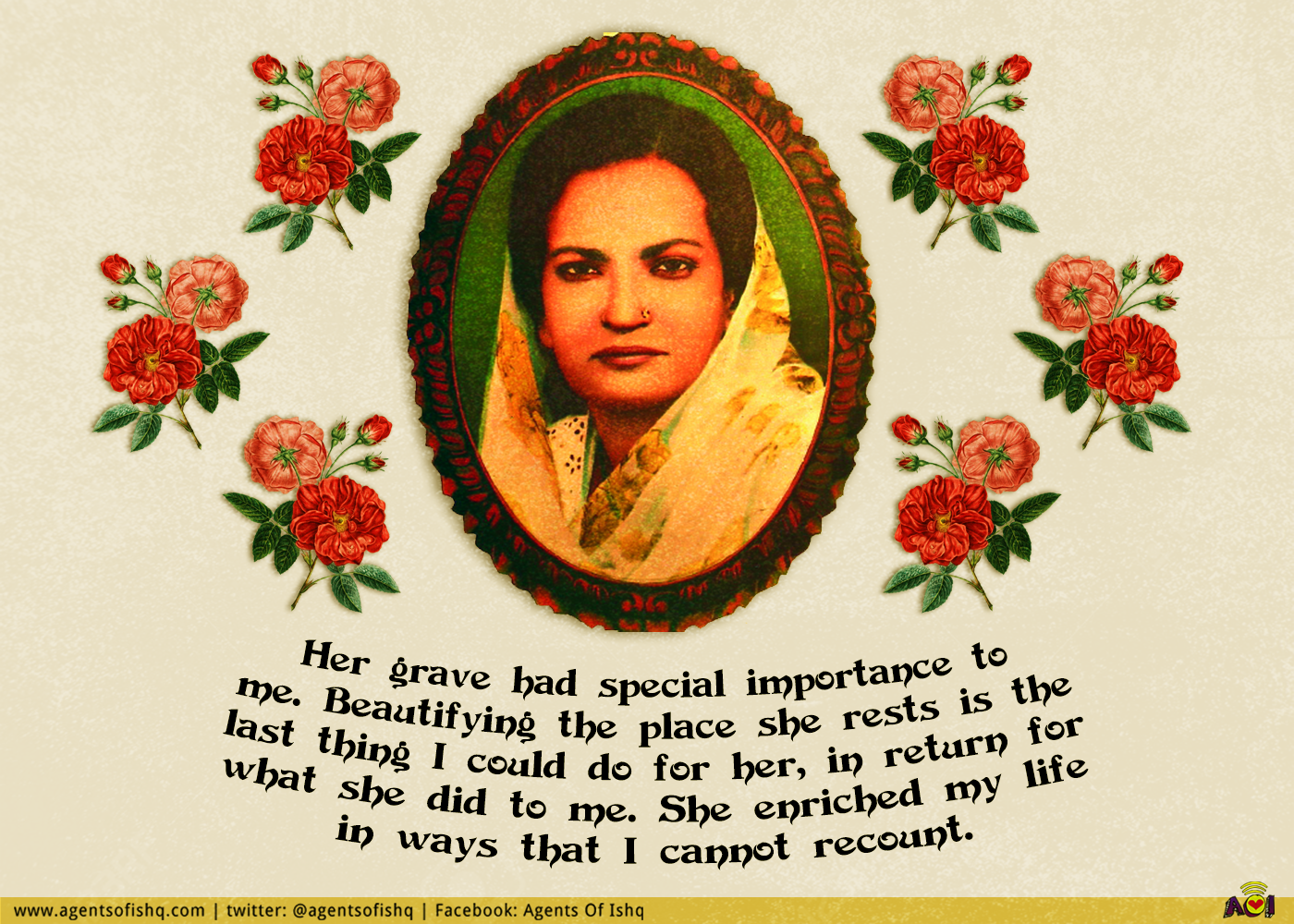 Q: How does she live on in your memory? Does it change, I mean the way you remember her?A: It changes, like all of us change all the time. Now I don’t collect every cutting that I find. I needed that at that time. See I am not a very ‘grave’ person. I do not visit graves, I don’t know when I last went to my parents’ grave. But her grave had special importance to me. Especially because it was a physical place. Like when auliyas (seers) pass away, why do we make a dargah? Their light, their grace is in that space. And the horrible state in which her grave was, used to worry both me and her senior disciple Shanti Hiranand a lot. She was such a big person, and what will remain of her in Lucknow? So when I came back to Lucknow, it just became my singular motive, to do something about saving the space and making it worthy of her. All the labour that Shanti apa and I did, that I would say was the last thing I could do for her. In return for what she did to me. I mean she enriched my life in ways that I can not even recount. I mean beautifying the place she rests - it’s not exactly something befitting her status but at least we aren’t ashamed. Q: She also lives in the collective memory of the world in that way, not just Lucknow but also beyond. Her art, you were so close to it and so affected by it, why do you think she became the icon that she continues to be? Maybe there was something about Ammi which lasted?A: Some people say she was the greatest singer of her time, but I don’t know about that. She had a chhoti zameen, a limited nature of music she performed, and she did that with perfection. Then why is it that she is considered more important than any of her contemporaries? I think it’s because she sang poetry, which was easily understood. Music was there, raagdari was there and people who had learnt music would appreciate it. But here she was also bringing people who could be totally attached to her without being musical people. They could just be attracted to poetry and the way she conveyed romance, particularly longing and heartbreak as I have said. And she did this more effectively than most.When I talked to other people I realized why romance was so important in the conceptualization of Begum Akhtar. Bilkul dil-phenk thin aakhir tak (And she was very free-spirited till the end). A lot of people used to fall in love with her, she used to cry about it herself. She would sing for people on the phone, I mean her singing on the phone, imagine!This association of her with romance, and the legend around her, of heartbreak...I understood this thing quite later, when I used to sit with her. The talk of the heart, it’s not as easy as it looks.
Q: How does she live on in your memory? Does it change, I mean the way you remember her?A: It changes, like all of us change all the time. Now I don’t collect every cutting that I find. I needed that at that time. See I am not a very ‘grave’ person. I do not visit graves, I don’t know when I last went to my parents’ grave. But her grave had special importance to me. Especially because it was a physical place. Like when auliyas (seers) pass away, why do we make a dargah? Their light, their grace is in that space. And the horrible state in which her grave was, used to worry both me and her senior disciple Shanti Hiranand a lot. She was such a big person, and what will remain of her in Lucknow? So when I came back to Lucknow, it just became my singular motive, to do something about saving the space and making it worthy of her. All the labour that Shanti apa and I did, that I would say was the last thing I could do for her. In return for what she did to me. I mean she enriched my life in ways that I can not even recount. I mean beautifying the place she rests - it’s not exactly something befitting her status but at least we aren’t ashamed. Q: She also lives in the collective memory of the world in that way, not just Lucknow but also beyond. Her art, you were so close to it and so affected by it, why do you think she became the icon that she continues to be? Maybe there was something about Ammi which lasted?A: Some people say she was the greatest singer of her time, but I don’t know about that. She had a chhoti zameen, a limited nature of music she performed, and she did that with perfection. Then why is it that she is considered more important than any of her contemporaries? I think it’s because she sang poetry, which was easily understood. Music was there, raagdari was there and people who had learnt music would appreciate it. But here she was also bringing people who could be totally attached to her without being musical people. They could just be attracted to poetry and the way she conveyed romance, particularly longing and heartbreak as I have said. And she did this more effectively than most.When I talked to other people I realized why romance was so important in the conceptualization of Begum Akhtar. Bilkul dil-phenk thin aakhir tak (And she was very free-spirited till the end). A lot of people used to fall in love with her, she used to cry about it herself. She would sing for people on the phone, I mean her singing on the phone, imagine!This association of her with romance, and the legend around her, of heartbreak...I understood this thing quite later, when I used to sit with her. The talk of the heart, it’s not as easy as it looks.































































































































































































































































































































































































































































































































































































































































































































































































































































































































































































































































































































































































































